In the United States, a political action committee (PAC) is a tax-exempt 527 organization that pools campaign contributions from members and donates those funds to campaigns for or against candidates, ballot initiatives, or legislation. The legal term PAC was created in pursuit of campaign finance reform in the United States. Democracies of other countries use different terms for the units of campaign spending or spending on political competition. At the U.S. federal level, an organization becomes a PAC when it receives or spends more than $1,000 for the purpose of influencing a federal election, and registers with the Federal Election Commission (FEC), according to the Federal Election Campaign Act as amended by the Bipartisan Campaign Reform Act of 2002. At the state level, an organization becomes a PAC according to the state's election laws.

The Federal Election Commission (FEC) is an independent agency of the United States government that enforces U.S. campaign finance laws and oversees U.S. federal elections. Created in 1974 through amendments to the Federal Election Campaign Act, the commission describes its duties as "to disclose campaign finance information, to enforce the provisions of the law such as the limits and prohibitions on contributions, and to oversee the public funding of Presidential elections." It is led by six commissioners who are nominated by the president and confirmed by the Senate.

Michael Richard Pence is an American politician and lawyer who served as the 48th vice president of the United States from 2017 to 2021 under President Donald Trump during his first administration. A member of the Republican Party, he previously served as the 50th governor of Indiana from 2013 to 2017, and as a member of the U.S. House of Representatives from 2001 to 2013.

James Brien Comey Jr. is an American lawyer who was the seventh director of the Federal Bureau of Investigation (FBI) from 2013 until his termination in May 2017. Comey was a registered Republican for most of his adult life but in 2016 he stated he was unaffiliated.

The financing of electoral campaigns in the United States happens at the federal, state, and local levels by contributions from individuals, corporations, political action committees, and sometimes the government. Campaign spending has risen steadily at least since 1990. For example, a candidate who won an election to the U.S. House of Representatives in 1990 spent on average $407,600, while the winner in 2022 spent on average $2.79 million; in the Senate, average spending for winning candidates went from $3.87 million to $26.53 million.

Ellen L. Weintraub is an American attorney who serves as Commissioner and Chair of the Federal Election Commission.

Presidential elections were held in the United States on November 8, 2016. The Republican ticket of businessman Donald Trump and Indiana governor Mike Pence defeated the Democratic ticket of former secretary of state and former first lady Hillary Clinton and Virginia junior senator Tim Kaine, in what was considered one of the biggest political upsets in American history. It was the fifth and most recent presidential election in which the winning candidate lost the popular vote. It was also the sixth and most recent presidential election in U.S. history in which both major party candidates were registered in the same home state, the others being 1860, 1904, 1920, 1940 and 1944, with both nominees having been registered in New York.
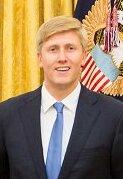
James Nicholas Ayers is an American political strategist and consultant who served as Chief of Staff to Vice President Mike Pence between July 2017 and January 2019. He had previously served as national chairman for Pence's vice-presidential campaign in 2016, as well as executive director of the Republican Governors Association from 2007 to 2010.
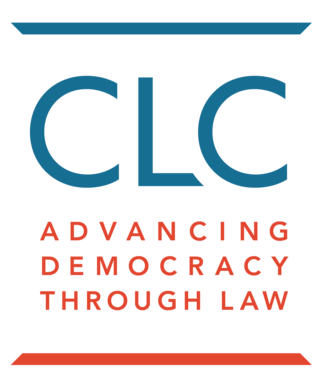
Campaign Legal Center (CLC) is a nonprofit 501(c)(3) government watchdog group in the United States. CLC supports strong enforcement of United States campaign finance laws. Trevor Potter, former Republican chairman of the Federal Election Commission, is CLC's founding president.
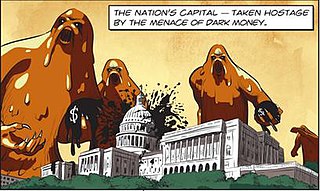
In politics, particularly the politics of the United States, dark money refers to spending to influence elections, public policy, and political discourse, where the source of the money is not disclosed to the public.

The 2018 United States Senate election in Ohio took place on November 6, 2018. The candidate filing deadline was February 7, 2018; the primary election was held on May 8, 2018. Incumbent Senator Sherrod Brown—the only remaining elected Democratic statewide officeholder in Ohio at the time of the election—won his reelection bid for a third term, defeating Republican U.S. Representative Jim Renacci by a 6.84% margin in the general election, larger than the 6% margin in the election six years earlier. This was one of ten Democratic-held Senate seats up for election in a state won by Donald Trump in the 2016 presidential election. Renacci conceded defeat on November 7, 2018.
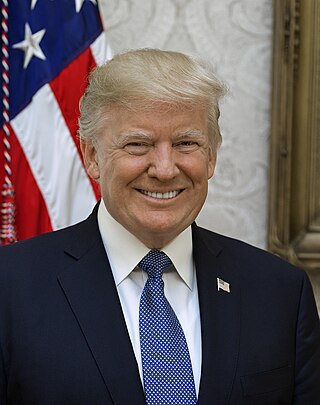
The first tenure of Donald Trump as the president of the United States began on January 20, 2017, when Trump was inaugurated as the 45th president, and ended on January 20, 2021. Trump, a Republican from New York, took office following his electoral college victory over Democratic nominee Hillary Clinton in the 2016 presidential election. Upon his inauguration, he became the first president in American history without prior public office or military background. Trump made an unprecedented number of false or misleading statements during his 2016 campaign and first presidency. His first presidency ended following his defeat in the 2020 presidential election to former Democratic vice president Joe Biden, after his first term in office.

The inauguration of Donald Trump as the 45th president of the United States marked the commencement of Trump's first term as president and Mike Pence's only term as vice president. An estimated 300,000 to 600,000 people attended the public ceremony held on Friday, January 20, 2017, at the West Front of the United States Capitol in Washington, D.C. The event was the 58th presidential inauguration. Held in Washington, D.C., from January 17 to 21, 2017, inaugural events included concerts, the swearing-in ceremony, a congressional luncheon, parade, inaugural balls, and the interfaith inaugural prayer service. The inauguration was protested worldwide.
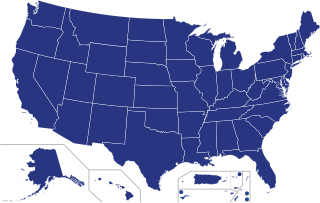
Presidential primaries and caucuses of the Republican Party took place in many U.S. states, the District of Columbia, and five U.S. territories from February 3 to August 11, 2020, to elect most of the 2,550 delegates to send to the Republican National Convention. Delegates to the national convention in other states were elected by the respective state party organizations. The delegates to the national convention voted on the first ballot to select Donald Trump as the Republican Party's nominee for president of the United States in the 2020 election, and selected Mike Pence as the vice-presidential nominee.

314 Action is a progressive nonprofit political action committee (PAC) that seeks to elect STEM educated Democrats to higher office in the United States.

Donald Trump, a member of the Republican Party, sought re-election in the 2020 United States presidential election. He was inaugurated as president of the United States on January 20, 2017, and filed for re-election with the Federal Election Commission (FEC) on the same day. This was Trump's third run for President, his second with the Republican Party, and the only campaign Trump ran as an incumbent.

The Case for Impeachment is a non-fiction book by American University Professor of History Allan Lichtman. The book argues for the impeachment of Donald Trump. It was published on April 18, 2017, by Dey Street Books, an imprint of HarperCollins. Lichtman predicted to The Washington Post that after ascending to the presidency, Trump would later be impeached from office. He developed this thesis into a set of multiple arguments for Trump's predicted impeachment.
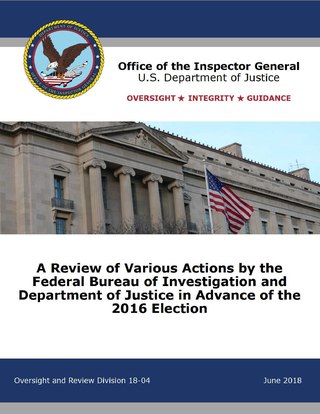
A Review of Various Actions by the Federal Bureau of Investigation and Department of Justice in Advance of the 2016 Election is the official 568-page report of the actions taken by the FBI and Department of Justice (DOJ) during the 2016 U.S. presidential election connected with Hillary Clinton's use of a private email server, prepared by the Department of Justice Office of the Inspector General (OIG) "in response to requests from numerous Chairmen and Ranking Members of Congressional oversight committees, various organizations, and members of the public."

Presidential primaries and caucuses of the Republican Party took place within all 50 U.S. states, the District of Columbia, and five U.S. territories between January 15, 2024, and June 4, 2024. These elections selected most of the 2,429 delegates to be sent to the Republican National Convention. Former president Donald Trump was nominated for president of the United States for a third consecutive election cycle.

The 2022 United States House of Representatives elections in Indiana were held on November 8, 2022, to elect the nine U.S. representatives from the state of Indiana, one from each of the state's nine congressional districts. The elections coincided with other elections to the U.S. House of Representatives, elections to the U.S. Senate, and various state and local elections. Primary elections took place on May 3.



















